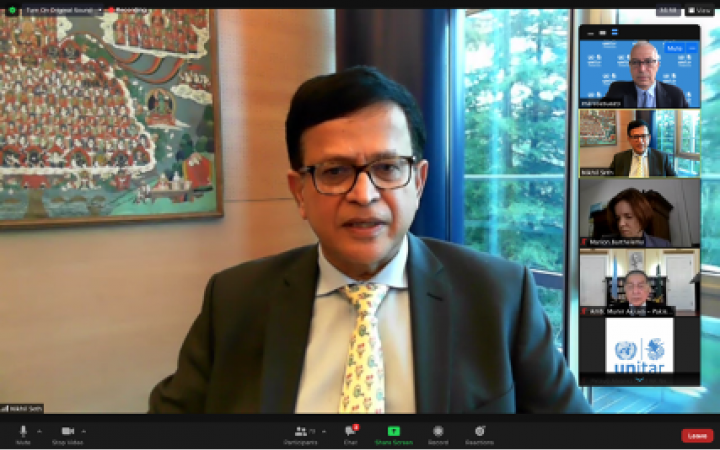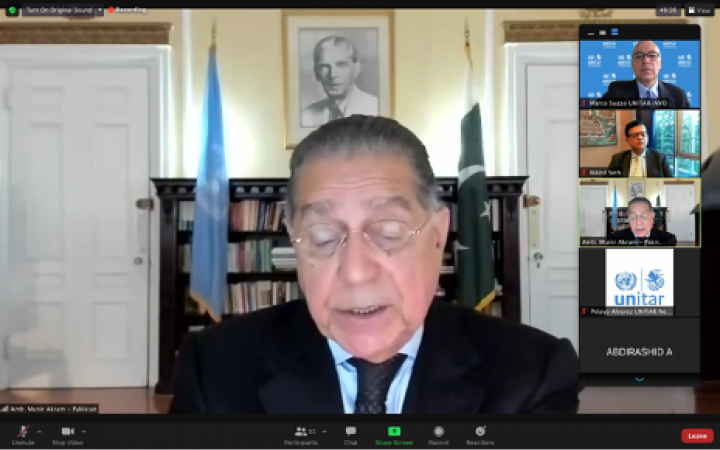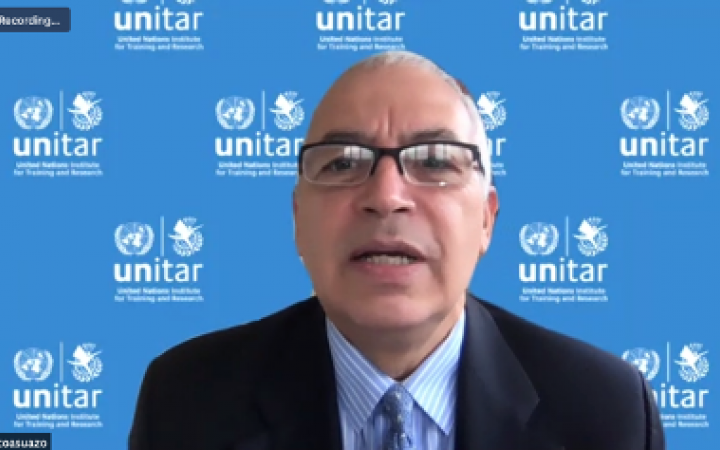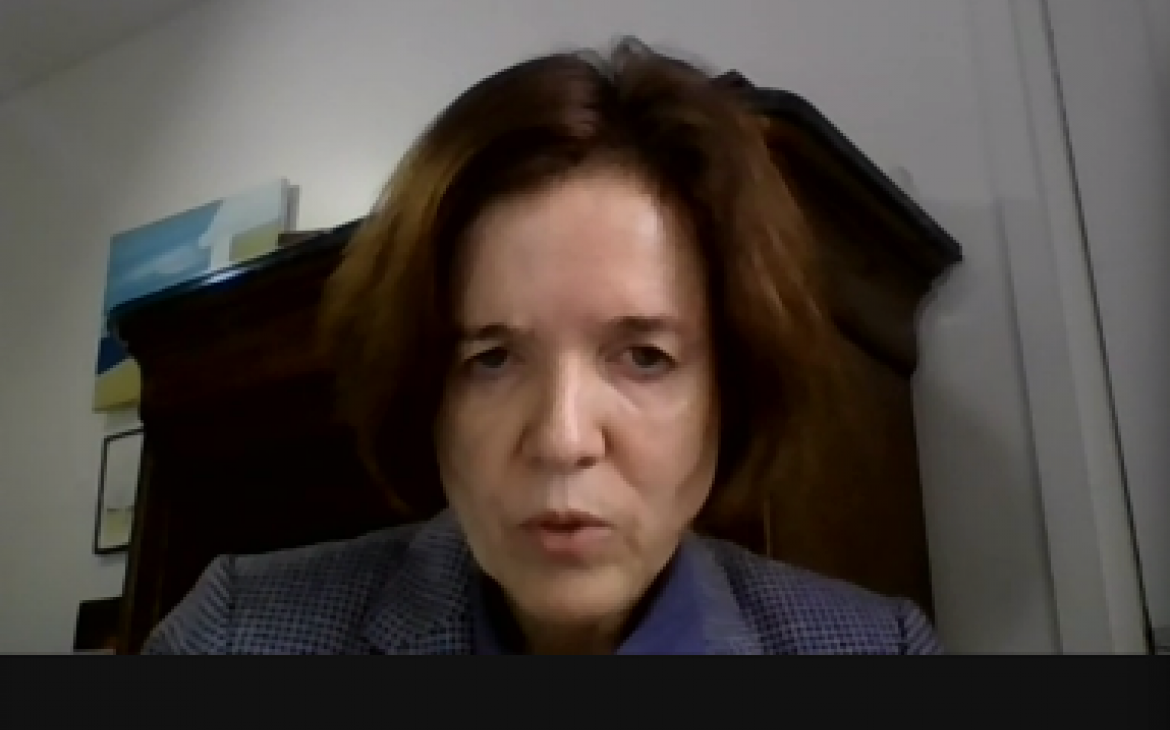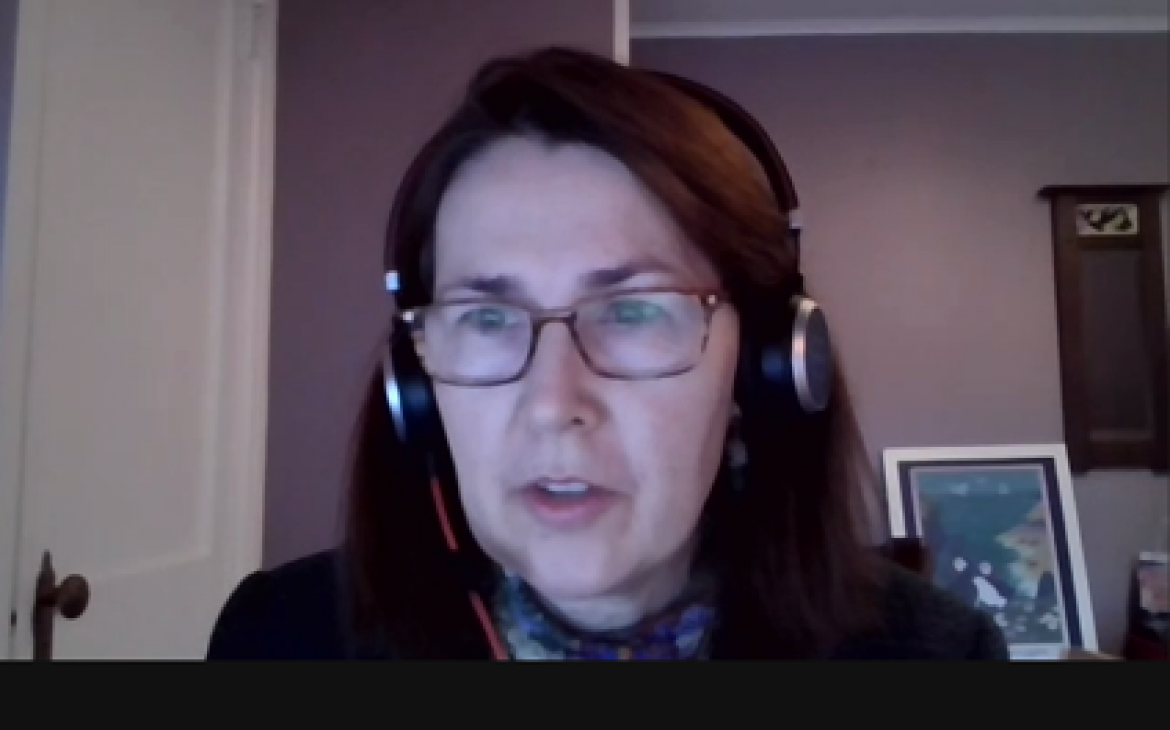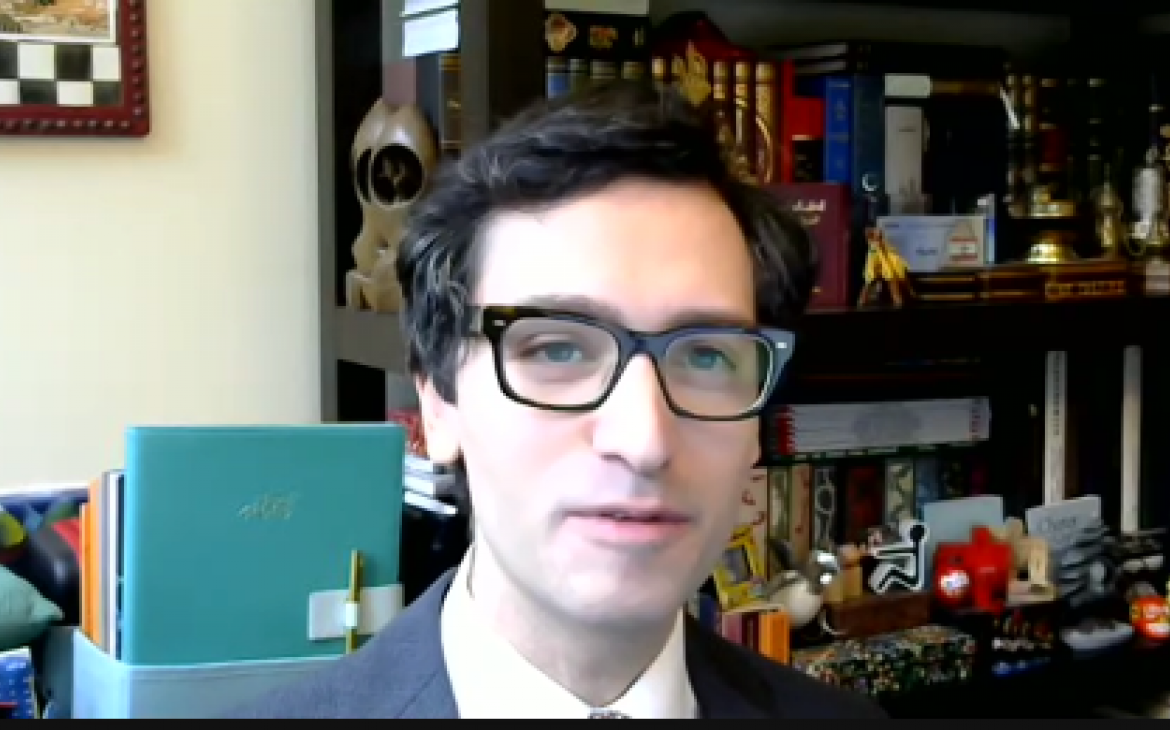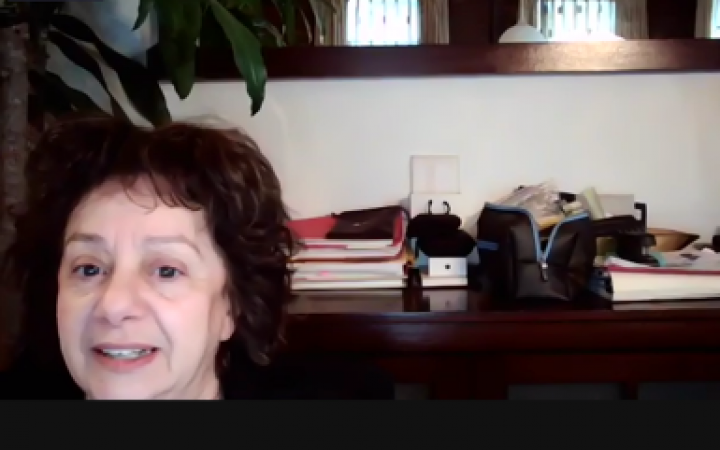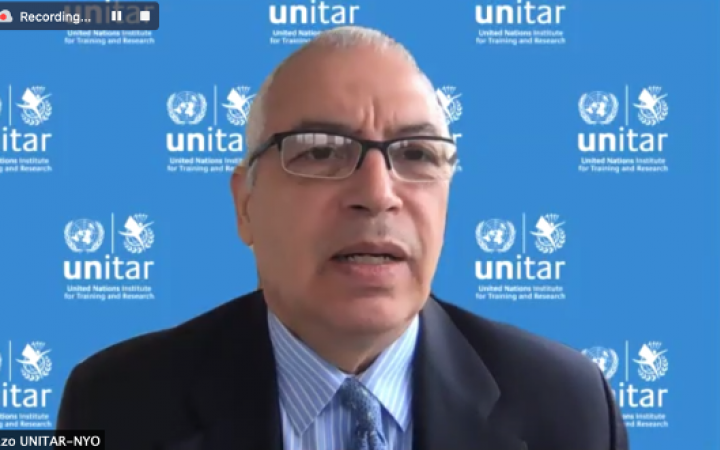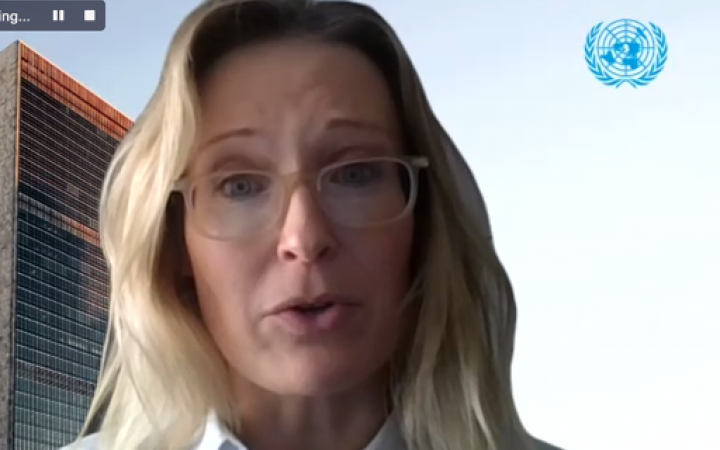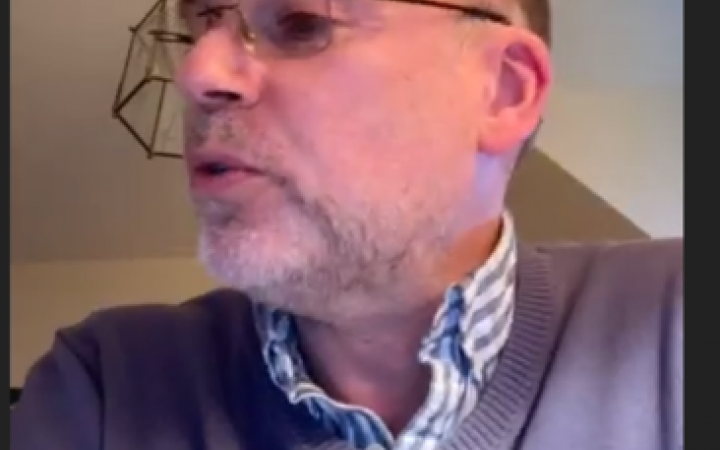26 - 27 January 2021, New York, USA (Virtual) – The United Nations Institute for Training and Research New York Office (UNITAR) kicked off the new year with a three-day orientation course on the Economic and Social Council for members of the council on Tuesday, 26 January 2021. The first session was delivered virtually with over 100 delegates participated, from different parts of the world The training was supported with funding allocated from the Swedish International Development Agency’s (SIDA) contribution to the UNITAR Strategic Framework Fund, under the programme ‘Leveling The Playing Field’ which focuses on the development of skills and knowledge of Least Developing Countries.
Mr. Marco Suazo, the head of UNITAR office in New York and the moderator of the day’s event briefly went through the first day programme with the participants, and passed the floor to the United Nations Assistant Secretary-General and the Executive Director of UNITAR, Mr. Nikhil Seth, to deliver his welcoming remarks.
Mr. Seth expressed his gratitude to all the high-level officials’ participation, especially for the presence of H.E. Mr. Munir Akram, the Permanent Representative of Pakistan to the United Nations and President of the ECOSOC; H.E. Ms. Sokkhoeurn An, the Permanent Representative of the Kingdom of Cambodia to the United Nations; and H.E. Mr. Alexander Marschik, the Permanent Representative of Austria to the United Nations, to the opening of the ECOSOC orientation event. As a multifaceted and highly resilient organ of the UN, Mr. Seth believed that ECOSOC entails four core functions: offering directions and guidance to other departments; providing powerful vision and oversight brings the UN together; integrating different aspects of SDGs as a highly efficient intergovernmental organization; and focusing on providing solutions for the contemporary world issues such as poverty, social justice, and cutting-edge technologies. At the end of his remarks, Mr. Seth urged the delegates to submerge themselves in the work and the environment of ECOSOC, and try not to lose sight of the bigger picture to eventually provide necessary help and resources to those who are truly in need.
Following the welcoming remarks, H.E. Mr. Munir Akram, the Permanent Representative of Pakistan to the United Nations and President of the ECOSOC delivered his keynote speech. As the entire UN celebrating the 75th anniversary of ECOSOC, he mentioned that during his presidency, he would focus on practical steps and concrete actions to achieve SDGs. The actions will include financing Covid-19 recovery, SDGs implementation and climate goals; mobilizing investment and sustainable infrastructure; and promoting the application of science and technologies. The ECOSOC has included more member states and has put on more items on its agenda throughout the past 75 years. As a principal organ that supports and advocate for multilateralism and visibility, he is confident that with the ECOSOC will not only exacerbate international collaboration but most importantly, help the world transition into a better place.
After Ambassador Akram’s keynote speech, Ms. Marion Barthelemy, Director of the Office of Intergovernmental Support and Coordination for Sustainable development of the Department of Economic and Social Affairs (DESA) opened the first session on the role of ECOSOC, its structures and related platforms, segments, mandates, outcomes, working methods and procedures. introducing the main functions and architecture of ECOSOC as a principal organ. She looked back at the reforming history of ECOSOC, debunked the main pillars of the 2030 Agenda for sustainable development, and clarified the functions and the responsibilities of ECOSOC under the authority of the General Assembly. Ms. Emer Herity, Secretary of ECOSOC and the Second Committee of the Department for General Assembly and Conference Management (DGACM) continued the first session with her presentation on the working methods and procedures of ECOSOC. She explained the role and functions of the ECOSOC President and Bureau, and she also mentioned the subsidiary bodies of the ECOSOC system. Most importantly, the decision-making process adapted to the current challenges posed by COVID-19.
Not only did ECOSOC allowed decision-making through silence procedure, but it also conducted elections through silence procedure, and fully adjusted to a virtual environment. In fact, the first virtual negotiation also took place this year. The system worked expeditiously throughout the difficulties and created a highly professional and efficient workflow and can effectively respond to today’s changing world. The second session titled “reviewing progress to accelerate implementation of the 2030 Agenda – the high-level political forum on sustainable development.” Ms. Irena Zubcevic, the Chief of Intergovernmental policy and review branch introduced different aspects related to the High-level Political Forum (HLPF) on Sustainable Development. Under the auspices of ECOSOC, HLPF meets every year and it discusses a wide range of topics and consists of several sections: special events, side events, voluntary national reviews labs, and exhibitions. She then positioned the HLPF in the UN architecture for the participants to better understand its functions and responsibilities. Mr. Ziad Mahmassani, the senior intergovernmental affairs officer of the Secretary of the Third Committee of the General Assembly continued the session with a detailed explanation on the status and organization of the HLPF. He also went over the participation and the past programmes of HLPF and mentioned briefly the follow-up and review items for HLPF in 2021.
The last session was on oversight and coordination of the UN system through ECOSOC’S operational activities segment. Mr. Matthew Hammill, development and intergovernmental affairs advisor at the UN DESA, and Ms. Zina Mounla, the Chief of the Operational Activities Policy Branch provided a comprehensive explanation on the function of Quadrennial Comprehensive Policy Review of operational activities (QCPR) and the roles and responsibilities of ECOSOC’s annual reviews following the adoption of the QCPR resolution. Both speakers went into details on the roles of ECOSOC in relation to the General Assembly’s resolution 72/279 on repositioning the UN development system, and the key issues, content, and applicability of the QCPR, as well as its potential for the UN development system to align with, and deliver on, the 2030 Agenda. Ms. Mounla ended the session with a concise summary of the framework for monitoring and evaluating the results following the adoption of the QCPR resolutions. The head of UNITAR office in New York concluded the first day training successfully. The first session was highly interactive with speakers actively engaging with participants online, answering their questions on the UN reforms, developments, and COVID-19 response in the field of international development. The session was well-received by the delegates, and it has provided abundant insights and the work of ECOSOC.
Continued with the first day’s session, the second day of the training started off with the fourth session on mobilizing financing and technology for the implementation of the 2030 Agenda. After a brief introduction of today’s programme by Mr. Suazo, Mr. Shantanu Mukherjee, the Chief of the Policy and Analysis Branch at Division for Sustainable Development at UN DESA elaborated on the forum on financing for development, the Development Cooperation Forum and multi-stakeholder forum on science, technology and innovation for the SDGs and their contribution to policy-making and the advancement of the 2030 Agenda. He mentioned that the 2021 session will first look at the trade-offs across all SDGs, discuss the synergies between science, technologies and SDGs; then discuss how innovations can strengthen the mission statement of “leaving no one behind”, and lastly, connect the latest academic research with the achievements of SDGs, and eventually, help build national capacities. Mr. Alberto Padova, the Deputy Chief in Policy Coordination Branch at the Department of ECOSOC continued the session with topics on financing for development forum, its outcome documents, and SDG investment fair. These events and interaction explained how the council offers an inclusive space for all the members to exchange experiences, knowledge and ideas. Ms. Caroline Lombardo, the Acting Chief of the international Tax and Development Cooperation Branch concluded the session by explaining the unique role of tax department in advancing the UN’s agenda.
The fifth session was on ECOSOC’s role in coordinating, guiding, and addressing peace, development, and humanitarian affairs. Ms. Leslie Wade, the Chief and the Senior Economic Affair Officer of DESA mentioned that although the interlinkages between the UN and the other three were not well-known, there was a historical relation between ECOSOC and Peacebuilding Commission, General Assembly, and Security Council. Mr. Anton Santanen, the Senior Humanitarian Affairs Officer at the Intergovernmental Policy area of the UN Office for the Coordination of Humanitarian Affairs (OCHA) expressed the increasing need for attention and resources in the field of humanitarian affairs. He also explained the dynamics between Member States and ECOSOC on raising global emergencies, trends, and challenges, especially in the field of violation of human rights.
The last session of the second day was on engaging stakeholders and forging partnership. Ms. Lotta Tahtinen, the Chief of outreach and partnership branch at UN DESA took over the role of the moderator for this session. Based on her years of experience, she explained how DESA organized with other actors and foster multi-stakeholder partnerships. In one way or another, HLPF serves as a crucial platform for regional officials to share their perceptions, success, and challenges while implementing SDGs.
The floor was then passed on to Ms. Patricia Chaves, the Senior Sustainable Development Officer and the Head of Partnerships Team at the United Nations Division for Sustainable Development. She introduced the structure and the special function oof the ECOSOC Youth Forum. The outcome document of the Youth Forum would be a summary of the discussion representing the voices of youth and would be sent as contributions to the HLPF session in July. In this fashion, it provides young people more access to participate in UN affairs, and international discussions. Mr. Marc-Andre, the Acting Chief of the DESA NGO Branch explained the relations between different NGOs with ECOSOC, and how their consultative status benefit the development and the richness of knowledge in ECOSOC. Civil society managed to get their voices, position, and experience heard by speaking at the UN. ECOSOC serves as a platform to engage stakeholders, such as civil society, youth, the private sector, parliamentarians, local authorities and academics through its various segments, forums, and instruments.
The second day of the event ended on a high note with abundant information on the finance of ECOSOC. This informative session has benefitted a significant amount of delegates, and the panelists’ experience have contributed to the new delegates’ familiarity of the UN. The 2021 ECOSOC orientation concluded successfully.


